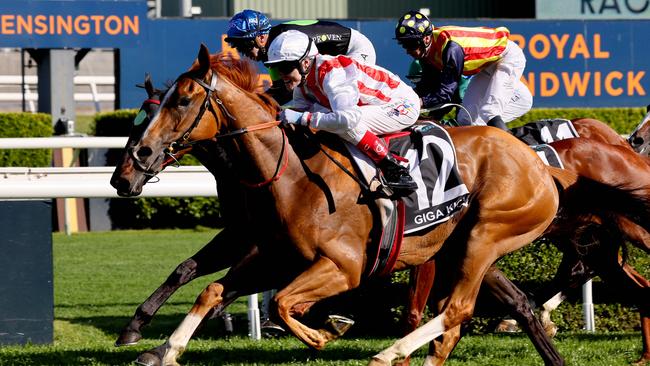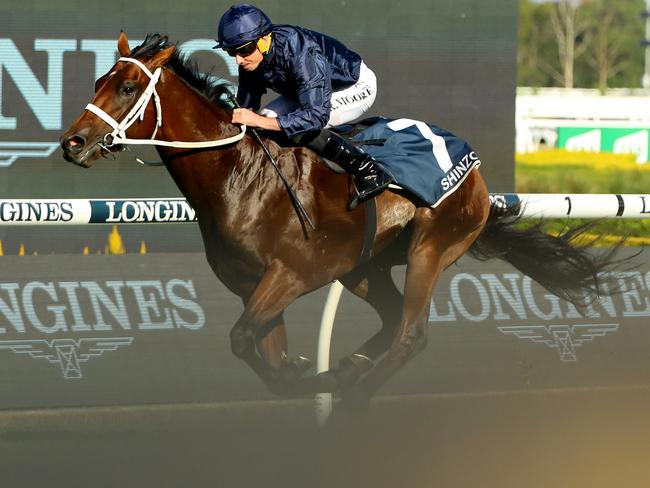The Everest: the summit of racing excellence
Now in its seventh running, this $20 million sprint captivates the thoroughbred world.

When Tenzing Norgay helped Edmund Hillary scale the summit of Everest in 1953, he was paid about $400. The horse that wins the Sydney race named after the world’s highest mountain will earn $7m and do the job a lot quicker than the Nepalese Sherpa and Kiwi mountaineer did. Sydney’s dry spell, and the elite athleticism of the thoroughbreds engaged, will see the 1200m of the $20m Everest run and won in a little over a minute.
The 2023 Everest, to be decided at Royal Randwick racecourse on October 14, is the seventh running of the equine equivalent of Lotto, devised by Racing NSW chief executive Peter V’landys. It is the richest race in Australia and the most lucrative turf race in the world, with only the Saudi Cup, run on dirt, worth more at $US20m ($31.4m).
The 2023 contest represents a changing of the guard, with the Edmund Hillarys of recent years, Nature Strip, who won the race as a seven-year-old in 2021, and his even older rival Eduardo, having been sent to the retirement paddock. At the same time, the young buck, Giga Kick, who won the race 12 months ago as a three-year-old stripling, is unable to defend his crown due to injury.
Neither Hillary nor Tenzing climbed Everest again. “We had done it first and that seemed to be enough for us,’’ Hillary said. Horse racing doesn’t work like that. The first winner of the Everest, Redzel in 2017, returned to the top the following year.
He is the only dual winner, equine-wise, but his jockey, Kerrin McEvoy, won for a third time in 2020, aboard the grey dasher Classique Legend, and has high hopes of going to four via the three-year-old colt Shinzo, the 2023 Golden Slipper winner.
Shinzo is in the all-conquering hands of Chris Waller, the nation’s leading trainer, who triumphed in 2019 with another three-year-old, Yes Yes Yes, and the aforementioned near-pensioner Nature Strip in 2021. He will also saddle up the five-year-old mare Espiona.
Redzel’s trainers, Sydney father and son team Peter and Paul Snowden, have a contender in the five-year-old gelding Mazu, who ran third in the 2022 Everest. When the first prize cheque is $7m, it’s hard to blame anyone for thinking one Everest is not enough.
Yet even just one would be welcome, as Gai Waterhouse, daughter of the legendary Sydney trainer TJ Smith, noted when asked about her contenders, the four-year-old stallion Hawaii-Five-Oh, owned by John Singleton and Gerry Harvey, and the final entry into the race, Alcohol Free, an Irish-bred five-year-old mare who was bought for $10m and shipped Down Under. “It would be a dream come true,’’ said Waterhouse, who trains in partnership with Adrian Bott.

(As an aside, Alcohol Free would be a paradoxical winner as the Sydney heat means the Randwick grass may be dry but the bars will be anything but. Another entrant, the four-year-old stallion Buenos Noches, seems to mangle the Spanish language. That, too – names that might upset grammarians or lose the spelling bee – is horse racing. Just ask the recently retired champion mare Winx.)
Another racing dynasty descendant, James Cummings, son of Melbourne Cup maestro Bart, has two runners, the four-year-old mare In Secret and the three-year-old colt Cylinder. Sydney trainer Joe Pride hopes his 2022 runner-up Private Eye, a six-year-old gelding, can go one better, but he also has the favourite at the time of writing, the five-year-old gelding Think About It.
Pride makes the point that his entire stable of horses made about $7m in the 2022 racing year and now he hopes one of them will win that much in one race that, on its record time to date, takes 1.07.32 to run.
“It’s crazy,’’ he said in a recent interview. “That’s where the Everest just throws your brain process out a bit.”
Zac Purton, the champion Australian jockey who will steer Cylinder, is another captured by the mind-boggling wonder of the turbocharged race. “Everyone at home talks about it.” By home, he means racing-mad Hong Kong, where he has been a champion rider since moving there in 2007.
Purton was so keen to be part of the race that he tried to persuade Hong Kong owners to enter a star horse he has ridden for them, the New Zealand-bred Lucky Sweynesse, who has won more than $17m. That didn’t happen but Cummings came to the rescue. “I’ve just wanted to be part of it,’’ Purton said. “Now I just have to win it.’’
The Everest is an invitational race open to 12 horses. The first step is that someone coughs up $700,000 for a “slot” in the race. The slot holders then decide which horse to put in their slot. It can be their own or someone else’s. The behind-the scenes negotiations on filling the slots adds to the race’s intrigue.
The prizemoney, which ranges from $7m for first to $700,000 – the slot fee – for last, is split between the slot holder and the owners of the horse, after the trainer and jockey have received their cut.
As with the horses, trainers and jockeys, this is not the first Everest for several slot holders. Businessman-owner-breeder Max Whitby has been there since the start. His 2023 slot, which he owns with Neil Werrett, is filled by third favourite Private Eye.
Businessman-owner Werrett, who has had slots before, was a part-owner of the sprinting superstar Black Caviar, who retired unbeaten in 2013. If the Everest had been around when she was, she would have won them all.
Black Caviar was trained by Victorian Peter Moody who, in his training partnership with Katherine Coleman, has the 2023 Everest equal favourite, I Wish I Win, a five-year-old gelding who was born with one leg so crooked it looked like he would have trouble walking, let alone galloping. He has won six races for accumulated earnings of $7.8m. That, too, is racing.
So who will win? In the six runnings to date there is one constant: only male horses have won. Even so, it’s worth remembering that the mares in the race, In Secret, Espiona and Alcohol Free, do not know that.
Based on the strike rate of jockeys, trainers and age of horse, the tip would be the three-year-old Shinzo, trained by Waller and ridden by McEvoy.
Another strategy is to back the one contender I have not mentioned in this race preview, the five-year-old gelding Overpass, trained by Sydneysider Bjorn Baker and with the talented Josh Parr on top. My selection is I Wish I Win, who was outright favourite until drawing barrier one, the last starting position a horse like him – one who drifts back in the field and comes home hard – wants. Again, that’s racing.



